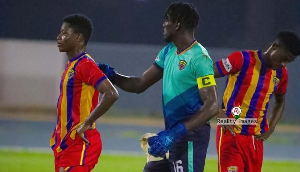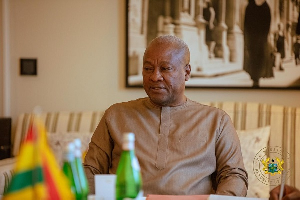FOR any layperson who has looked at the particulars or facts on the charge sheet against Eric Amoateng, the Member of Parliament for Nkoranza North, it would be difficult not to presume that the great philanthropist from Brong Ahafo, who is said to be sponsoring, among others, the tertiary education of about 87 students, is guilty as charged.
This could very well be the case, but this is also another opportunity to remind Ghanaians of the fundamental legal principle of presumption of innocence. It is an essential right that the accused enjoys in criminal trial in all countries respecting human rights, including Ghana and the United States of America.
It states that ?no person shall be considered guilty until finally convicted by a court.? The burden of proof is thus on the prosecution, which has to convince the court of the guilt of the accused. The Principle of Presumption of Innocence is phrased such that ?the accused is presumed to be innocent until it has been declared guilty by a court?. This abbreviated form neglects the point that a person may continue to appeal a decision, and will be presumed innocent until a final decision is made. Therefore, in strict legality, people who have been found guilty in lower courts of law, but have pending appeals, cannot have their citizen?s rights (such as to vote and to be elected) stripped nor can they be permanently removed from their offices, but merely suspended.
Although the Constitution of the United States does not cite it explicitly, presumption of innocence is widely held to follow from the 5th, 6th, and 14th amendments. In the nineteenth-century authoritative case of Coffin v United States, the Supreme Court held, ?The principle that there is a presumption of innocence in favor of the accused is the undoubted law, axiomatic and elementary, and its enforcement lies at the foundation of the administration of our criminal law....?
Yet, one cannot ignore the wider political implications of the MP?s arrest. It is, without a doubt, the biggest scandal of international proportions to hit this Parliament. It is all over the news worldwide. Now, he has the task to exonerate himself, his reputation, the august House and hopefully that of his country. We are hereby urging him to do the ?honourable? thing and jump or be pushed.
Section 17 of the Standing Orders of the Parliament of Ghana states that a ?Member who desires to resign his seat in the House shall notify Mr Speaker in writing under his hand of his intention to resign his seat and Mr Speaker shall inform the House as soon as practicable.? We believe the proper course of action now is for him to resign from his position as a legislator and concentrate on his defence against the prosecution.
Failing which, he must be pushed and there are sound political reasons and legal support for that. Section 15 of the Standing Orders says every Member shall attend sittings unless leave of absence has been given by the Speaker; and leave may be given only after the MP ?shows sufficient cause justifying his absence or who is away on official or parliamentary duties.?
It appears he did in fact seek and was granted permission to travel to the US. First, according to the Office of the Clerk of Parliament, the permission was granted based on a request to attend to his daughter who was ill. Secondly, the permission was for a set period ? until November 24.
Section 16 of the Standing Orders is clear: ?A Member shall not absent himself during meeting for more than fifteen sittings without the permission in writing of the Speaker. Any Member infringing this Order shall have his conduct referred to the Privileges Committee.?
Thus, Parliament can take the extreme decision that he has effectively vacated his seat after not hearing from him beyond the fifteen days. His case is different from that of Dan Abodakpi, another Member facing criminal charges. Unlike the NDC MP, the NPP MP is facing trial under a foreign jurisdiction. This means that he cannot undertake the primary function of representing his constituents. The trial is likely to take up to one year. His constituents should not suffer the wait-and-see agony of a trial. We cannot assume this is an open and shut case.
Since this session of Parliament is expected to close before the fifteen days (under Section 16) are over, he can do his constituents, his colleagues and his nation a favour by resigning. His resignation before the end of this week would save his party the dilemma of condemning and distancing themselves from a colleague who is yet to be convicted by a competent court of jurisdiction; who, nevertheless, is a grave embarrassment to all.
Mr Amoateng should avoid putting his party in a position that would force them to expel him, prejudicially. But, the Party can say that for even bringing the Party?s name into disrepute, contempt and ridicule they have decided to expel him. Under Article 97(1) (g), an MP shall vacate his seat in Parliament ?if he leaves the party of which he was a member at the time of his election to Parliament to join another party or seeks to remain in Parliament as an independent member??
If the MP for Nkoranza North compels the NPP to expel him that would constitute leaving the party of which he was elected as MP. Already the hawks in the NPP are calling for such a quick-fix action. They want to see the ruling party severing all ties with him as soon as possible. NPP National Chairman Esseku has all but said Mr Amoateng has forfeited his party membership for bringing the NPP?s name into disrepute. The decent thing to do, under the circumstances, is to offer your resignation as MP to defend your case in the US criminal court. The NPP can then take the safe option of suspending you until judgment is passed on the 62 kilos drugs charge.
For President Kufuor, our simple advice to him is to see this challenge as an opportunity to crack down on Ghana?s growing but menacing reputation as a major transitional point for the smuggling of hard drugs.
General News of Wednesday, 23 November 2005
Source: Statesman
















